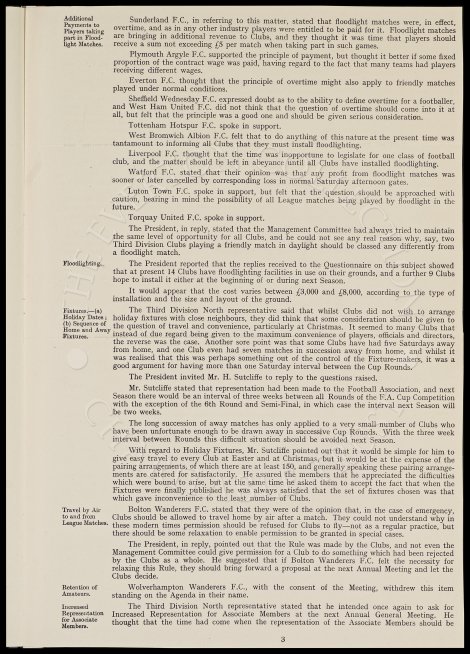
Additional Sunderland F. C., in referring to this matter, stated that floodlight matches were, in effect, Payments to overtime, and as in any other industry players were entitled to be paid for it. Floodlight matches Players taking are bringing in additional revenue to Clubs, and they thought it was time that players should part in Flood- receive a sum not exceeding £5 per match when taking part in such games. light Matches. Plymouth Argyle F.C. supported the principle of payment, but thought it better if some fixed proportion of the contract wage was paid, having regard to the fact that many teams had players receiving different wages. Everton F.C. thought that the principle of overtime might also apply to friendly matches played under normal conditions. Sheffield Wednesday F.C. expressed doubt as to the ability to define overtime for a footballer, and West Ham United F.C. did not think that the question of overtime should come into it at all, but felt that the principle was a good one and should be given serious consideration. Tottenham Hotspur F.C. spoke in support. West Bromwich Albion F.C. felt that to do anything of this nature at the present time was tantamount to informing all Clubs that they must install floodlighting. Liverpool F.C. thought that the time was inopportune to legislate for one class of football club, and the matter should be left in abeyance until all Clubs have installed floodlighting. Watford F.C. stated that their opinion was that any profit from floodlight matches was sooner or later cancelled by corresponding loss in normal Saturday afternoon gates. Luton Town F.C. spoke in support, but felt that the question should be approached with caution, bearing in mind the possibility of all League matches being played by floodlight in the future. Torquay United F.C. spoke in support. The President, in reply, stated that the Management Committee had always tried to maintain the same level of opportunity for all Clubs, and he could not see any real reason why, say, two Third Division Clubs playing a friendly match in daylight should be classed any differently from a floodlight match. Floodlighting. The President reported that the replies received to the Questionnaire on this subject showed that at present 14 Clubs have floodlighting facilities in use on their grounds, and a further 9 Clubs hope to install it either at the beginning of or during next Season. It would appear that the cost varies between £3,000 and £8,000, according to the type of installation and the size and layout of the ground. Fixtures.—(a) The Third Division North representative said that whilst Clubs did not wish to arrange Holiday Dates; holiday fixtures with close neighbours, they did think that some consideration should be given to (b) Sequence of the question of travel and convenience, particularly at Christmas. It seemed to many Clubs that Home and Away instead of due regard being given to the maximum convenience of players, officials and directors, Fixtures. the reverse was the case. Another sore point was that some Clubs have had five Saturdays away from home, and one Club even had seven matches in succession away from home, and whilst it was realised that this was perhaps something out of the control of the Fixture-makers, it was a good argument for having more than one Saturday interval between the Cup Rounds. The President invited Mr. H. Sutcliffe to reply to the questions raised. Mr. Sutcliffe stated that representation had been made to the Football Association, and next Season there would be an interval of three weeks between all Rounds of the F.A. Cup Competition with the exception of the 6th Round and Semi-Final, in which case the interval next Season will be two weeks. The long succession of away matches has only applied to a very small number of Clubs who have been unfortunate enough to be drawn away in successive Cup Rounds. With the three week interval between Rounds this difficult situation should be avoided next Season. With regard to Holiday Fixtures, Mr. Sutcliffe pointed out that it would be simple for him to give easy travel to every Club at Easter and at Christmas, but it would be at the expense of the pairing arrangements, of which there are at least 150, and generally speaking these pairing arrange- ments are catered for satisfactorily. He assured the members that he appreciated the difficulties which were bound to arise, but at the same time he asked them to accept the fact that when the Fixtures were finally published he was always satisfied that the set of fixtures chosen was that which gave inconvenience to the least number of Clubs. Travel by Air Bolton Wanderers F.C. stated that they were of the opinion that, in the case of emergency, to and from Clubs should be allowed to travel home by air after a match. They could not understand why in League Matches. these modern times permission should be refused for Clubs to fly—not as a regular practice, but there should be some relaxation to enable permission to be granted in special cases. The President, in reply, pointed out that the Rule was made by the Clubs, and not even the Management Committee could give permission for a Club to do something which had been rejected by the Clubs as a whole. He suggested that if Bolton Wanderers F.C. felt the necessity for relaxing this Rule, they should bring forward a proposal at the next Annual Meeting and let the Clubs decide. Retention of Wolverhampton Wanderers F.C, with the consent of the Meeting, withdrew this item Amateurs. standing on the Agenda in their name. Increased The Third Division North representative stated that he intended once again to ask for Representation Increased Representation for Associate Members at the next Annual General Meeting. He for Associate thought that the time had come when the representation of the Associate Members should be Members. 3
